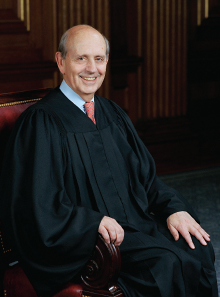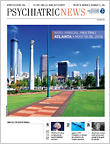Should U.S. law on matters affecting human rights, capital punishment, and other issues be influenced by judicial developments internationally?
U.S. Supreme Court Justice Stephen Breyer will address those and other matters of interest to psychiatrists as a featured speaker at APA’s 2016 Annual Meeting in Atlanta.
As a 1994 appointee to the Court (by President Clinton), Breyer has been a pragmatic voice, arguing for an approach that bears in mind congressional intent in the formation of law. He was, for instance, one of six justices who upheld a key provision of the Affordable Care Act last year, arguing that it was Congressional intent in the ACA to allow use of tax-credit subsidies to pay for health insurance premiums for low-income Americans even in states that did not have their own insurance exchanges but relied on federal exchanges. “Congress passed the Affordable Care Act to improve health insurance markets, not to destroy them,” Chief Justice Roberts wrote for the majority (
Psychiatric News, July 3, 2015).
Breyer has also argued for the promotion of what he calls “active liberty” in the interpretation of the Constitution, over a more literalist or “originalist” approach. In the 2004 Tanner Lecture on Human Values at Harvard Law School titled “Active Liberty: Interpreting Our Democratic Constitution,” Breyer stated, “Literalism has a tendency to undermine the Constitution’s efforts to create a framework for democratic government—a government that, while protecting basic individual liberties, permits citizens to govern themselves, and to govern themselves effectively. Insofar as a more literal interpretive approach undermines this basic objective, it is inconsistent with the most fundamental original intention of the Framers themselves.”
Breyer has written books and articles about administrative law, economic regulation, and constitutional law, including Regulation and Its Reform, Breaking the Vicious Circle: Toward Effective Risk Regulation, Active Liberty, and Making Our Democracy Work: A Judge’s View. His most recent book, The Court and the World, examines the question of whether American jurisprudence can be entirely independent of legal and judicial developments throughout the world.
On a range of issues, Breyer asserts that in a globablized world, it cannot. A September 14, 2015, review in the New York Times stated: “Breyer contends that events in the world have effectively resolved the foreign law controversy. Playing the judge as enlightened modern technocrat, he offers a reasoned elaboration of the mounting costs that judicial isolationism would entail in our increasingly interconnected world. Globalization, he argues, has made engagement with foreign law and international affairs simply unavoidable.”
It is a contentious issue, as The Times review noted. “According to critics on the court and elsewhere, international rulemaking is government from afar: It threatens the very project of constitutional independence that the framers set in motion in 1787. Breyer, by contrast, sees the role of courts in a radically different light. In democracies, he says, courts are specialized problem solvers. Judicial isolationism, he rightly insists, will make it difficult for judges to address the kinds of problems we need them to solve in the ever smaller world of the 21st century.”
Breyer is a graduate of Stanford University, Oxford University, and Harvard Law School. He taught law for many years at Harvard Law School and the Kennedy School of Government. He has also worked as a Supreme Court law clerk (for Justice Arthur Goldberg), a Justice Department lawyer (antitrust division), an assistant Watergate special prosecutor, and chief counsel of the Senate Judiciary Committee (working closely with Sen. Edward M. Kennedy to pass the Airline Deregulation Act). In 1980 he was appointed to the U.S. Court of Appeals for the First Circuit by President Carter, becoming chief judge in 1990 before being appointed to the Supreme Court in 1994.
His wife, Joanna, is a retired clinical psychologist. ■

